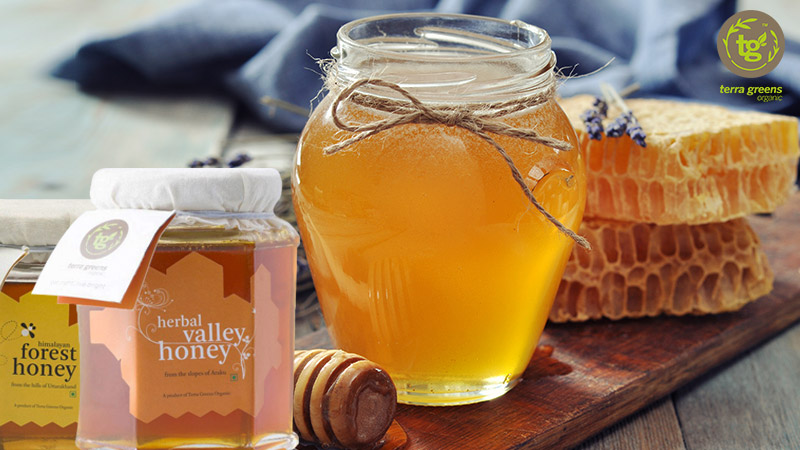Honey has been eaten by humans since time immemorial. The ancient Greeks believed it to be the food of Zeus, the king of Gods, and the twelve gods of Olympus: they called it ambrosia or nectar, the food of immortality.
In India too, honey is considered one of the five elixirs of immortality and used to ‘bathe’ deities in temples- Madhu Abhisheka.
Herbal honey is what humans have experimented with for centuries: it is honey infused with herbs and spices. There are some of those unenlightened individuals who shrug off the benefits of herbal honey.
Here is why we should discredit certain misconceptions:
#Myth 1: Herbal honey is mumbo-jumbo: it has no basis in medicine.
Nothing could be further from the truth than this. Ayurveda firmly believes in the therapeutic use of honey blended with certain herbs and spices.
Honey mixed with ginger juice is advised for coughs. Honey mixed with carrot juice is recommended for good eyesight. Honey infused with garlic juice is beneficial to high blood pressure. The list is long.
Ayurveda believes in holistic health, and many consider it to be a harmonious form of treating chronic ailments like constipation, arthritis, etc. by balancing the various elements of the body.
#Myth 2: Herbal honey is just sugar with some flavour added to it.
Honey contains the sugars fructose and glucose, no doubt. That’s the reason for its sweetness. But it also contains vitamins like vitamin B6, niacin, thiamine, riboflavin. The minerals present in honey are magnesium, potassium, phosphorous, sodium and zinc. All these are essential for the proper functioning of the human body.
When medicinal herbs like rosemary or thyme (ajwain) are added, they add their therapeutic properties to those of honey. Rosemary, for instance, is extremely good for relieving pain and inflammation as well as being a good de-toxicant. Thyme infused honey is recommended for coughs and digestion; it serves as a good diuretic too. Sage honey is more effective as a cough syrup than many over-the-counter brands.
#Myth 3: Herbal honey spoils easily, so it’s better avoided
Herbal honey does not spoil if made in the right way by experts who know how. Here are a few points to ponder:
- If raw honey is being infused, your source of honey needs to be a safe one, or you will land up with bacterial infections.
- Drying the herbs before infusing is safer than using raw ones which have their moisture content intact.
- Some kinds of herbal honey are made by heating the honey and ‘stewing’ the herbs in it; some swear by infusing dried herbs and exposing to the sun.
- Bottling herbal honey should be done with care after sterilising and completely drying the bottles.
How much to heat? How long to expose to sunlight? Leave the making of herbal honey to the experts.
#Myth 4: Herbal honey is not good for diabetics
Diabetes is NOT about controlling sugar intake: it is about controlling calories consumed. Pure honey is a MUCH better choice not only than sugar but also artificial sweeteners as it has a lower glycemic index. Herbal honey infused with dry methi (fenugreek) leaves or powder requires much lower levels of insulin to metabolise.
#Myth 5: Herbal honey is a botulism risk
Botulism isn’t something exclusive to honey or herbal honey. It is food poisoning caused by a kind of bacterium in improperly sterilised canned meats and other preserved products. Current medical advice prescribes that honey is best avoided in infants less than 12 months of age– as a precaution. Botulism from herbal honey is not an adult risk.
#Myth 6: Herbal honey is all about taste and flavour
Of course, it is! How soothing is a hot cup of tea infused with the smell of lemon honey!
Hot summers are time for cool drinks. Honey infused with mint is a great cooler: you can add it to watermelon juice, or try ginger infused honey added to lemon juice.
Do the taste and flavour just stop at the tongue? No, the ‘good and happy’ feeling is because herbal honey is a good mood elevator. It cools the body and calms the mind.
# Myth 7: Herbal honey is a good sugar replacement in baking.
Honey, herbal or otherwise, has no value for health when heated above 60°C. In fact, the ayurvedic belief is that eating heated honey increases mucus formation.
#Myth 8: Herbal honey should be made ONLY from local raw honey
This is a myth propagated by do-it-yourself hardliners who will start the process by rearing the bees! It is not practical and not even necessary. A good brand which sources its honey AND herbs from safe and organic produce will ensure that you receive all the benefits that herbal honey can gift you.
#Myth 9: Pregnant women should avoid eating raw herbal honey
Pregnant women should feel free to enjoy this health food. Botulism is rarely an adult concern and certainly not from herbal honey. Any botulism spores will be destroyed in the mother’s digestive system by adult enzymes: there is no chance at all of their crossing the placental barrier.
#Myth 10: Herbal honey cannot really induce sleep
Honey is mainly made up of fructose and glucose. These are reduced sugars that can be quickly absorbed by the blood and are essential nutrients for neurons and our nervous systems. Herbal honey infused with herbs like catnip, passionflower, and lemon balm, mixed in hot tea or milk or even warm water, is a great soporific. Sweet dreams!
Herbal honey should be everyone’s cup of tea! Add it to tea (of course!), on top of yogurt or ice cream, on toast, fruit, breakfast cereal, or just take a spoonful on its own. Organic herbal honey is absolutely chemical free with all the goodness of nature.
Good health, good taste, and good mood: those are the three gifts that you will receive.

